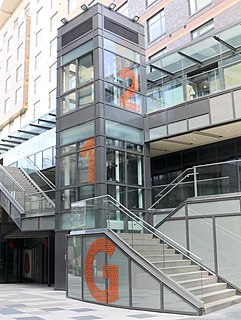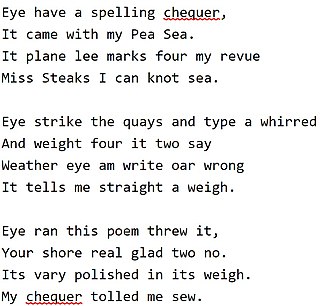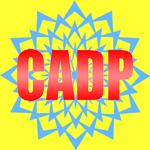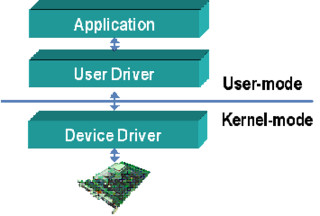Related Research Articles
In computer science, specifically software engineering and hardware engineering, formal methods are a particular kind of mathematically rigorous techniques for the specification, development and verification of software and hardware systems. The use of formal methods for software and hardware design is motivated by the expectation that, as in other engineering disciplines, performing appropriate mathematical analysis can contribute to the reliability and robustness of a design.
In computer science, communicating sequential processes (CSP) is a formal language for describing patterns of interaction in concurrent systems. It is a member of the family of mathematical theories of concurrency known as process algebras, or process calculi, based on message passing via channels. CSP was highly influential in the design of the occam programming language and also influenced the design of programming languages such as Limbo, RaftLib, Erlang, Go, Crystal, and Clojure's core.async.
In the context of hardware and software systems, formal verification is the act of proving or disproving the correctness of intended algorithms underlying a system with respect to a certain formal specification or property, using formal methods of mathematics.

In computer science, model checking or property checking is a method for checking whether a finite-state model of a system meets a given specification. This is typically associated with hardware or software systems, where the specification contains liveness requirements as well as safety requirements.
A hybrid system is a dynamical system that exhibits both continuous and discrete dynamic behavior – a system that can both flow and jump. Often, the term "hybrid dynamical system" is used, to distinguish over hybrid systems such as those that combine neural nets and fuzzy logic, or electrical and mechanical drivelines. A hybrid system has the benefit of encompassing a larger class of systems within its structure, allowing for more flexibility in modeling dynamic phenomena.

In software, a spell checker is a software feature that checks for misspellings in a text. Spell-checking features are often embedded in software or services, such as a word processor, email client, electronic dictionary, or search engine.
The Berkeley Lazy Abstraction Software verification Tool (BLAST) is a software model checking tool for C programs. The task addressed by BLAST is the need to check whether software satisfies the behavioral requirements of its associated interfaces. BLAST employs counterexample-driven automatic abstraction refinement to construct an abstract model that is then model-checked for safety properties. The abstraction is constructed on the fly, and only to the requested precision.

A grammar checker, in computing terms, is a program, or part of a program, that attempts to verify written text for grammatical correctness. Grammar checkers are most often implemented as a feature of a larger program, such as a word processor, but are also available as a stand-alone application that can be activated from within programs that work with editable text.

Model-based testing is an application of model-based design for designing and optionally also executing artifacts to perform software testing or system testing. Models can be used to represent the desired behavior of a system under test (SUT), or to represent testing strategies and a test environment. The picture on the right depicts the former approach.
The SLAM project, which was started in 1999 by Thomas Ball and Sriram Rajamani of Microsoft Research, aimed at verifying software safety properties using model checking techniques. It was implemented in OCaml, and has been used to find many bugs in Windows Device Drivers. It is distributed as part of the Microsoft Windows Driver Foundation development kit as the Static Driver Verifier (SDV). "SLAM originally was an acronym but we found it too cumbersome to explain. We now prefer to think of 'slamming' the bugs in a program." It probably stood for "Software, Languages, Analysis, and Modeling." Note that Microsoft has since re-used SLAM to stand for "Social Location Annotation Mobile".
In computer science and mathematical logic, satisfiability modulo theories (SMT) is the problem of determining whether a mathematical formula is satisfiable. It generalizes the Boolean satisfiability problem (SAT) to more complex formulas involving real numbers, integers, and/or various data structures such as lists, arrays, bit vectors, and strings. The name is derived from the fact that these expressions are interpreted within ("modulo") a certain formal theory in first-order logic with equality. SMT solvers are tools which aim to solve the SMT problem for a practical subset of inputs. SMT solvers such as Z3 and CVC4 have been used as a building block for a wide range of applications across computer science, including in automated theorem proving, program analysis, program verification, and software testing.
NuSMV is a reimplementation and extension of SMV symbolic model checker, the first model checking tool based on Binary Decision Diagrams (BDDs). The tool has been designed as an open architecture for model checking. It is aimed at reliable verification of industrially sized designs, for use as a backend for other verification tools and as a research tool for formal verification techniques.
The Library of Efficient Data types and Algorithms (LEDA) is a proprietarily-licensed software library providing C++ implementations of a broad variety of algorithms for graph theory and computational geometry. It was originally developed by the Max Planck Institute for Informatics Saarbrücken. Since 2001, LEDA is further developed and distributed by the Algorithmic Solutions Software GmbH.

Joseph Sifakis is a Greek-French computer scientist and academic with French and Greek citizenship. He received the 2007 Turing Award, along with Edmund M. Clarke and E. Allen Emerson, for his work on model checking.
In computing, compiler correctness is the branch of computer science that deals with trying to show that a compiler behaves according to its language specification. Techniques include developing the compiler using formal methods and using rigorous testing on an existing compiler.

CADP is a toolbox for the design of communication protocols and distributed systems. CADP is developed by the CONVECS team at INRIA Rhone-Alpes and connected to various complementary tools. CADP is maintained, regularly improved, and used in many industrial projects.
Concolic testing is a hybrid software verification technique that performs symbolic execution, a classical technique that treats program variables as symbolic variables, along a concrete execution path. Symbolic execution is used in conjunction with an automated theorem prover or constraint solver based on constraint logic programming to generate new concrete inputs with the aim of maximizing code coverage. Its main focus is finding bugs in real-world software, rather than demonstrating program correctness.

Device drivers are programs which allow software or higher-level computer programs to interact with a hardware device. These software components act as a link between the devices and the operating systems, communicating with each of these systems and executing commands. They provide an abstraction layer for the software above and also mediate the communication between the operating system kernel and the devices below.
Helmut Veith was an Austrian computer scientist who worked on the areas of computer-aided verification, software engineering, computer security, and logic in computer science. He was a Professor of Informatics at the Vienna University of Technology, Austria.
References
- ↑ Official website of CPAchecker: http://cpachecker.sosy-lab.org
- ↑ Dirk Beyer and Thomas A. Henzinger and Ranjit Jhala and Rupak Majumdar (2007). "The Software Model Checker BLAST: Applications to Software Engineering" (PDF). International Journal on Software Tools for Technology Transfer (STTT). 9: 505–525. doi:10.1007/s10009-007-0044-z. S2CID 1662778.
- ↑ Dirk Beyer and Thomas A. Henzinger and Grégory Théoduloz (2007). "Configurable Software Verification: Concretizing the Convergence of model Checking and program analysis" (PDF). Proceedings of the 19th International Conference on Computer Aided Verification. Springer-Verlag, Heidelberg. ISBN 978-3-540-73367-6.
- ↑ Dirk Beyer and M. Erkan Keremoglu (2011). "CPAchecker: A Tool for Configurable Software Verification" (PDF). Proceedings of the 23rd International Conference on Computer Aided Verification. Springer-Verlag, Heidelberg. ISBN 978-3-642-22109-5.
- ↑ Linux Driver Verification: http://linuxtesting.org/project/ldv
- ↑ Dirk Beyer (2012). "Competition on Software Verification (SV-COMP)" (PDF). Proceedings of the 18th International Conference on Tools and Algorithms for the Construction and of Analysis Systems. Springer-Verlag, Heidelberg.
- ↑ Dirk Beyer (2013). "Second Competition on Software Verification (Summary of SV-COMP 2013)" (PDF). Proceedings of the 19th International Conference on Tools and Algorithms for the Construction and of Analysis Systems. Springer-Verlag, Heidelberg.